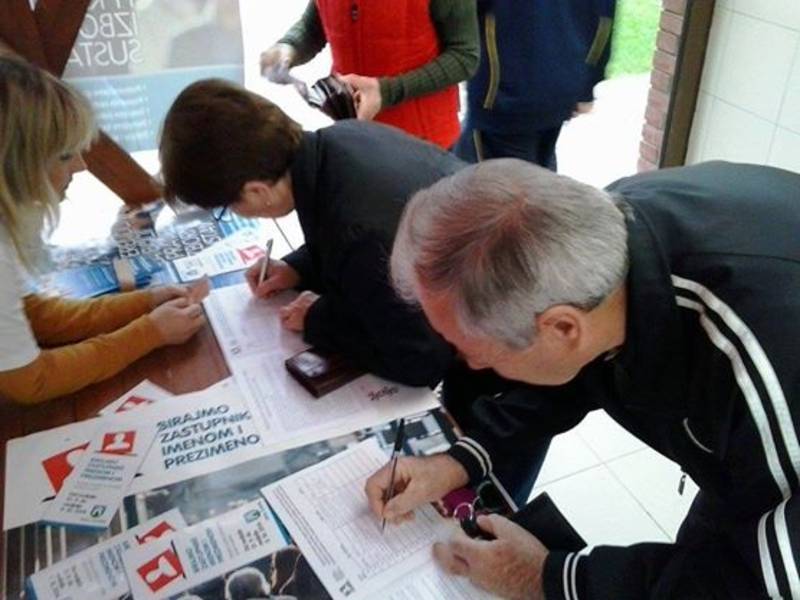In Croatia Voters Matter while in Bulgaria they Don't
Adelina Marini, October 18, 2014
It took only a week for the Croatian citizens to turn upside down the position of the big political parties on a change of the election legislation. However, this happened thanks to the interference of President Ivo Josipovic. This is a frustrating contrast against the backdrop of the lightning speed with which the big political parities united in Bulgaria against the preferential voting, which has seriously upset their calculations at the snap parliamentary elections on 5 October. Then 34% of all who cast a ballot used the possibility to rearrange party lists. The problem is, however, that a major part of them probably made an error because the phenomenon 15/15 that was born at the European elections earlier this year, has multiplied. A phenomenon that cannot be seen in Croatia where the preferential vote is currently applied only in elections for the European Parliament.

Was it because the system is too complicated or because the responsible institutions failed to explain sufficiently well what the preferential voting is and what powers does it give to the voters but it is a fact that just days after the elections the big political parties in Bulgaria started deliberating on another change of the electoral code aimed at abolishing the preference. And it was incepted as a code to put an end once and for all to the permanent changing of the election system every time when a party does not like it. So, the Bulgarian voters are on their way to lose the few democracy they received after street pressure.
Unlike them, in the EU's newest member state - Croatia - the citizens are on their way to win the battle against party dinosaurs and to ensure the right to say who they like more to govern them and who they do not. As euinside wrote, signatures have been collected to initiate a referendum on the issue which, however, was not enough to force the big political forces to agree. Moreover, they started to pass the ball to one another, arrogantly ignoring the new realities and their falling ratings. Until President Ivo Josipovic interfered, who is fighting for a second term at elections that will either take place in the end of December or in the beginning of January. Mr Josipovic sent a semi-open letter to the speaker of the Sabor Josip Leko asking him the do what is necessary the citizens' voice to be heard.
This angered many of the Croatian MPs who complained that they were circumvented. But the outcome is that now the government and the main political parties are willing to meet the demand for preferential vote at parliamentary elections. The cabinet decided this week to immediately send a draft law amending the election legislation so that it is approved before the year's end. The haste is because of the rule the election legislation not to be touched a year before general elections. This is something that had to happen in Bulgaria long ago, as well, but there was no political will for it. And on Tuesday, a meeting is scheduled of the Presidents' Council of the Croatian parliament with a main topic the change of the electoral law and the introduction of preferential vote. Although complaining and unhappy, even the Croatian Democratic Union (HDZ) - the biggest opposition party in Croatia - announced that it would support the change. The reason is that after some cunning manoeuvres by Prime Minister Zoran Milanovic and after the surprising move by President Josipovic, HDZ risked to remain isolated and presented as the only hurdle before the citizens' will which would not have had a good impact on their march toward government.
Although none of the sides acted out of idealistic reasons, the main lesson for Bulgaria from this Croatian story is that the Croats have obviously succeeded in forcing the institutions and political parties to listen to them. They did not seek counter-initiatives nor did they launch a campaign that would present the initiative In the Name of Family a force of evil or a discrediting media campaign against everyone who dared to demand more rights in their society. With the first pressure those who represent the citizens yielded to their will. A key role played the media as well who sided with the citizens. By the end of the year, in these two EU member states two completely opposite processes will unravel. Both the Bulgarian and Croatian parliaments will begin discussing changes to the electoral legislation. However, with different directions. In Bulgaria, they will be depriving the citizens of the power of their voice while in Croatia they will give them more power. This is a very good example of what a rule of law state is - the place where the law serves the citizens not a specific elite.
 Kolinda Grabar-Kitarovic | © KGK
Kolinda Grabar-Kitarovic | © KGK Jozo Rados | © European Parliament
Jozo Rados | © European Parliament Aleksandar Vucic, Andrej Plenkovic | © Vlada RH
Aleksandar Vucic, Andrej Plenkovic | © Vlada RH